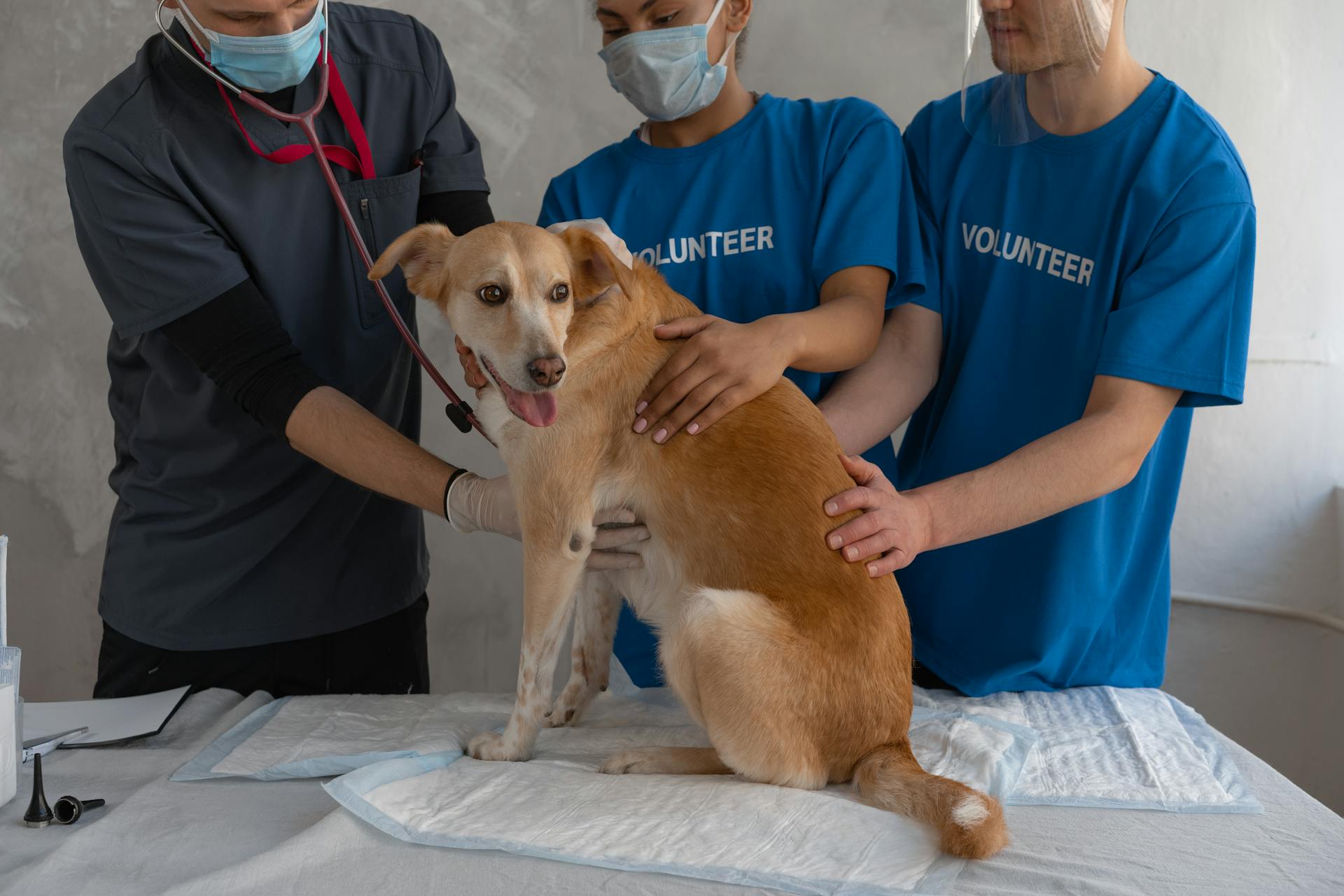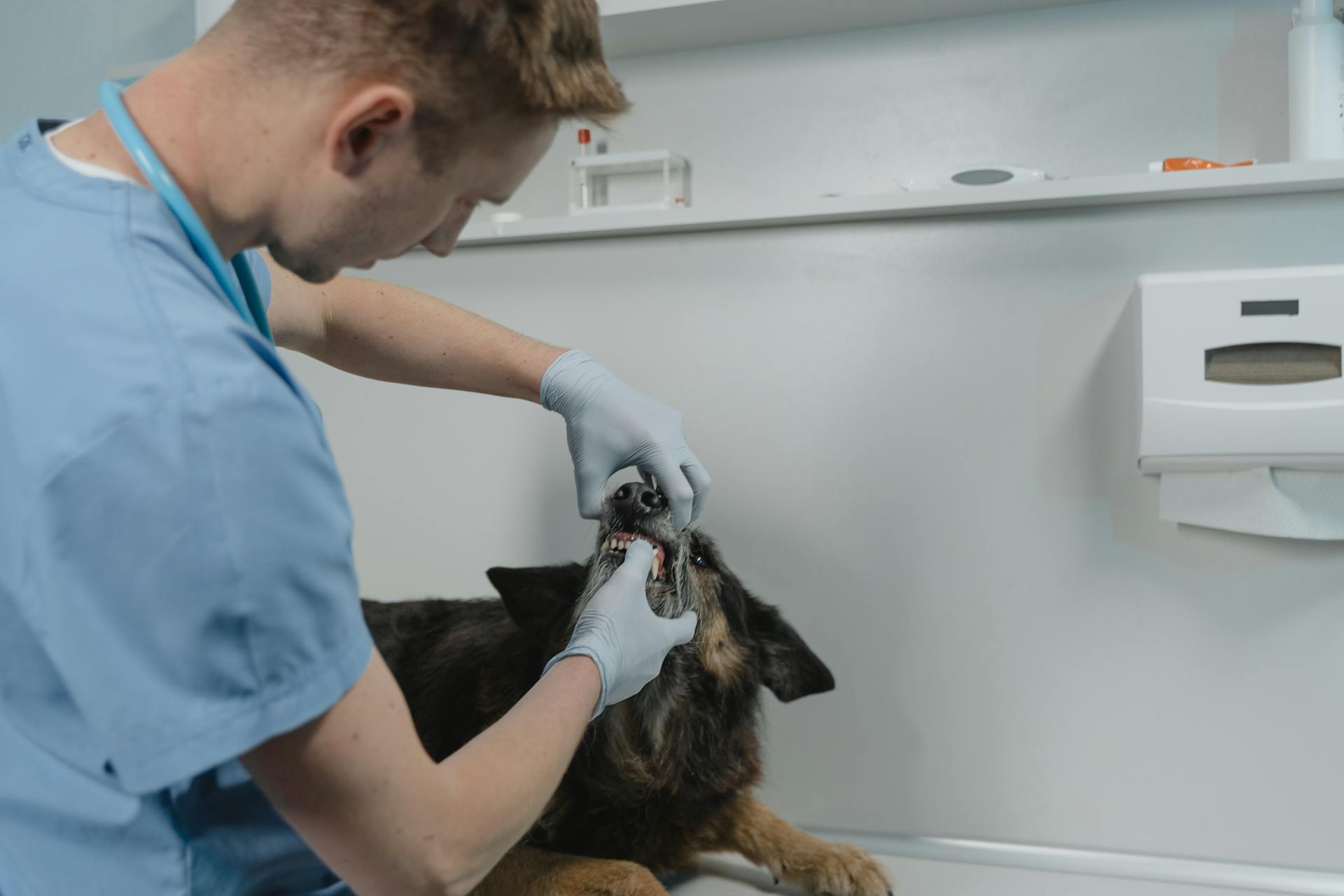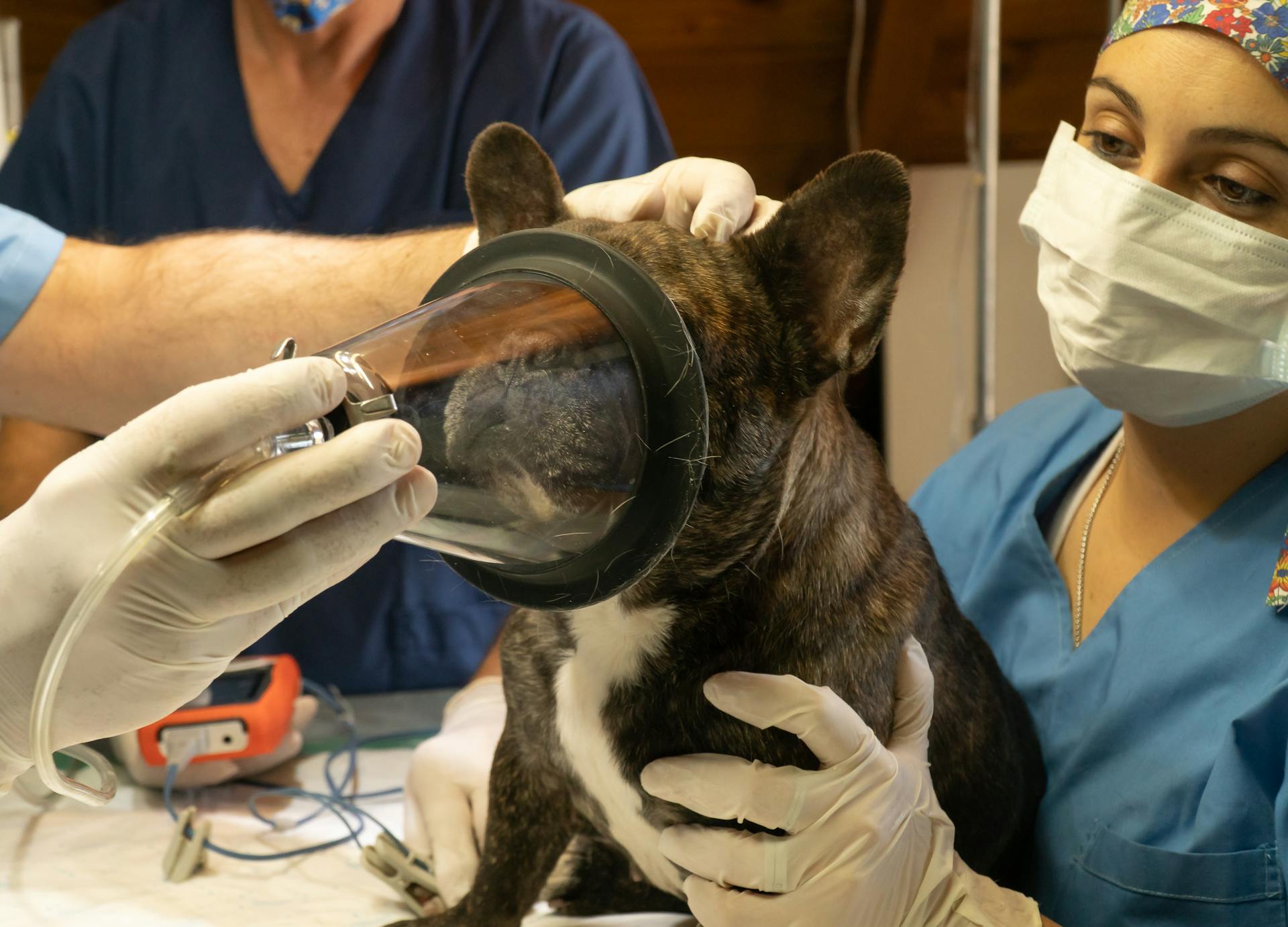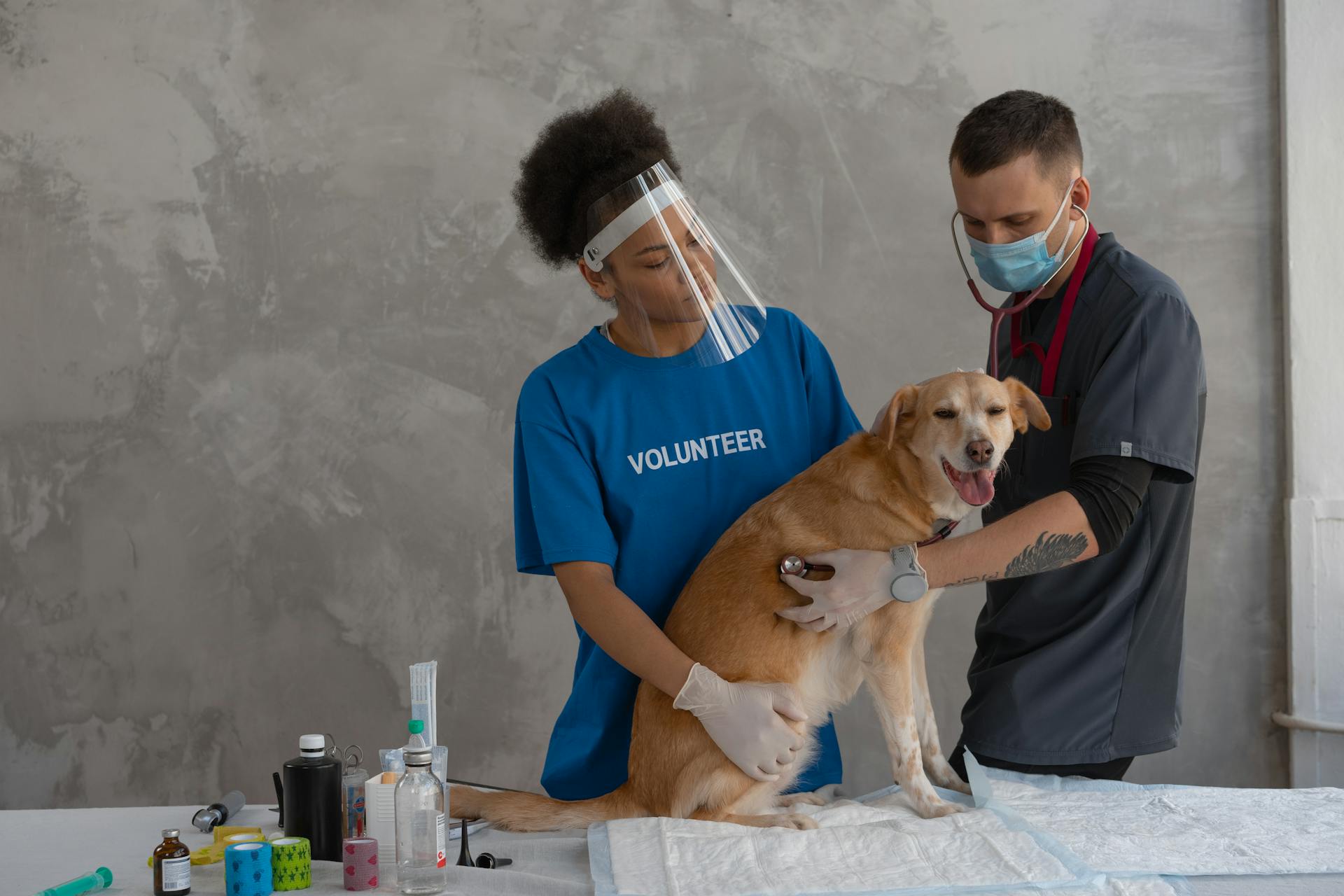
If your furry friend is experiencing diarrhea, it's essential to consider the possibility that allergies could be the culprit. According to research, allergies can cause diarrhea in dogs by triggering an immune response that disrupts the digestive system.
In many cases, food allergies are the primary cause of diarrhea in dogs. A study found that 10% of dogs suffer from food allergies, which can lead to gastrointestinal symptoms like diarrhea.
Common food allergens in dogs include beef, dairy, and wheat. If your dog is experiencing diarrhea, it's worth exploring the possibility that one of these ingredients is the culprit.
Can Allergies Cause Diarrhea in Dogs?
Diarrhea is a common symptom of food allergies in dogs, and it's essential to identify the underlying cause to provide the right treatment. If your dog has allergies, particularly food allergies, there's a good chance that diarrhea is one of the things you're dealing with.
Diarrhea caused by allergies can be accompanied by other symptoms, such as blood or pus in the stool, mucus or foam in the stool, and increased salivation. If you notice any of these symptoms, it's worth talking to your vet about the possibility of allergies being the cause.
A fresh viewpoint: Blood in Puppys Stool

To determine whether allergies are causing your dog's diarrhea, pay attention to the timing of the diarrhea. If it only occurs after your dog eats certain foods or comes into contact with certain materials, it's likely that allergies are to blame.
Here are some common signs of food allergies in dogs:
- Itchy skin, particularly near the ears, paws, rear end, and stomach
- Skin issues, such as hives or urticaria
- Tummy trouble, including gas, vomiting, and diarrhea
- Swollen face, ears, lips, or eyelids
If you suspect that allergies might be causing your dog's diarrhea, talk to your vet about next steps and consider an elimination diet to identify the specific allergen.
Understanding Food Allergies
Food allergies can be a sneaky culprit behind diarrhea in dogs. A food allergy happens because a pet's immune system mistakenly identifies food as a threat, triggering an allergic reaction.
The most common symptoms of food allergies in dogs include itchy skin, skin issues like hives, and gastrointestinal issues like diarrhea and vomiting. Food sensitivities, on the other hand, can also cause digestive issues, but they don't trigger an immediate immune system response.
A unique perspective: English Bull Terrier Skin Problems

Some common food allergens in dogs include proteins from dairy, beef, chicken, chicken eggs, soy, and wheat gluten. If your dog is experiencing chronic diarrhea and related symptoms, it's essential to consider the possibility of a food allergy.
Are Some Ingredients More Likely to Cause?
Proteins are the most common culprits behind food allergies in dogs. This is likely because they're often found in common allergenic foods like dairy, beef, and chicken.
Dairy, beef, chicken, chicken eggs, soy, and wheat gluten are the most common food allergens in dogs. These ingredients are commonly found in many pet foods.
Virtually any food ingredient can produce an allergy, but proteins are the most common culprits. This means that even seemingly harmless foods can cause a reaction in some dogs.
Expand your knowledge: Dog Canned Chicken
Core Types of Dog Allergic Reactions
A food allergy happens because of a pet's immune system mistakenly attacking harmless food particles. This immune response can cause a range of symptoms in dogs.

There are three common types of dog allergies: environmental or seasonal allergies, food allergies, and flea allergy dermatitis. Food allergies are a genetic response to proteins that the immune system views as invading.
Common symptoms of food allergies in dogs include itchy skin, skin issues like hives, and gastrointestinal problems like diarrhea and vomiting. These symptoms can manifest in different ways, and pets may have itchiness, vomiting, and/or diarrhea.
Some common food allergens include chicken, beef, egg, fish (for cats), and dairy products. These ingredients can cause a reaction in dogs, leading to symptoms like itchy skin and gastrointestinal issues.
Here are some common symptoms of food allergies in dogs:
- Itchiness
- Hives
- Swelling of the face, ears, lips, eyelids, or earflaps
- Red, inflamed skin
- Diarrhea
- Vomiting
- Sneezing
- Itchy ears
- Chronic ear infections
- Itchy, runny eyes
- Constant licking
Identifying the specific allergen can be challenging, but it's essential to try basic treatments and consider allergy testing and an elimination diet to determine the cause of the symptoms.
Diagnosing Food Allergies
Diagnosing food allergies in dogs can be a bit of a process, but it's worth it to understand what's causing your dog's symptoms.

The best way to diagnose a food allergy is to feed a hypoallergenic diet for 8 to 12 weeks as a food trial, called an elimination trial. This means your dog can't have any ingredients they've eaten before, including flavored vitamins and certain parasite preventives.
A food trial requires a special diet that's nutritionally complete and should only be done under the care of a vet or nutritionist. It takes several steps, including switching your dog to a new diet, waiting for symptoms to clear up, and then re-introducing old foods to see if symptoms return.
If your dog's symptoms clear up on the new diet, it may mean they have a food allergy. But that's not settled yet – you need to do a food challenge by re-introducing their old food to see if symptoms return.
Other conditions that could trigger the same symptoms need to be ruled out first. Your vet may propose allergy testing to try and determine the cause of the allergen, but it may not always be possible to determine the cause with testing.
Here are some common symptoms of food allergies in dogs:
- Itchy skin
- Hives (urticaria)
- Tummy trouble (gas, vomiting, diarrhea)
- Swollen face
- Chronic ear or paw infections
Note: These symptoms can also be caused by other conditions, so it's essential to rule out other possibilities before diagnosing a food allergy.

Your vet may try to rule out other conditions that could lead to your dog's symptoms before proposing allergy testing. If they feel an allergy is a likely cause, they may suggest an elimination diet to try and determine the cause of the allergen.
The elimination diet should only be done under the care of a vet or nutritionist, and it takes several steps:
1. Switch your pet to a diet made of things it has never eaten.
2. Wait for 10-12 weeks for symptoms to clear up.
3. Re-introduce old foods one at a time to see if symptoms return.
This process can take weeks or months, so it's essential to work with a professional to ensure you're doing it in a nutritionally complete way.
Treating Food Allergies
If your dog has a food allergy, the first step is to identify the offending food substance and choose a diet that doesn't contain it. Your veterinarian can prescribe a hypoallergenic diet that's tailored to your dog's needs.
There are three types of hypoallergenic diets: veterinary hydrolyzed protein diet, veterinary novel protein diet, and home-prepared novel protein diet. The veterinary hydrolyzed protein diet breaks down protein molecules to a size too small to be recognized by your dog's immune system.
Some dog foods may claim to be "limited-ingredient" but it's essential to note that retail pet foods may not have the same health and safety protocols as veterinary diets to prevent cross-contamination.
Your veterinarian will prescribe the best option specific to your dog's needs, so it's crucial to work with them to determine the best course of treatment.
Here are the three types of hypoallergenic diets:
- Veterinary hydrolyzed protein diet
- Veterinary novel protein diet
- Home-prepared novel protein diet
A veterinary nutritionist can help formulate a home-prepared novel protein diet, which typically requires the addition of a balancing supplement.
Consulting a Veterinarian
If you suspect your dog may have allergies causing diarrhea, it's essential to consult a veterinarian. They will help determine if allergies are the culprit behind your dog's symptoms.
Your veterinarian will consider the age of onset, which is typically within the first three years of life for environmental allergies, and between 5-7 years old for food allergies. They'll also take into account your dog's breed and the seasonality of the symptoms.

To decide whether allergies are the cause, your veterinarian will need information about your dog's diet and any previous or current diets they've been on. They may also ask about any snacks or treats you give your dog, including those from your dinner plate or bought at the pet store.
Here are some key things to share with your veterinarian:
- The symptoms your dog is experiencing, including the dates they started
- The food your dog is eating, including any snacks or treats
- Any medications or supplements your dog is taking
- Other potential allergy triggers, such as fleas, pollen, or dust mites
Frequently Asked Questions
Is diarrhea a symptom of chicken allergy in dogs?
Yes, diarrhea is a possible symptom of a chicken allergy in dogs. If you suspect your dog has a chicken allergy, look for other digestive symptoms like vomiting, gas, or gastrointestinal problems.
Sources
- https://www.petmd.com/dog/general-health/7-dog-allergy-symptoms-look
- https://vcahospitals.com/know-your-pet/food-allergies-in-dogs
- https://www.buddyandlola.co.uk/blogs/news/what-to-do-about-allergies-and-diarrhoea-in-dogs
- https://www.akc.org/expert-advice/health/dog-allergies-symptoms-treatment/
- https://www.webmd.com/pets/dog-cat-food-allergies
Featured Images: pexels.com


